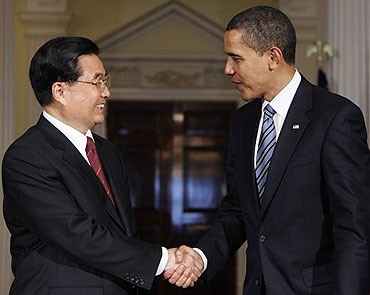
Presidents Hu and Obama Source: Google Images
Looks like Mr. Hu and Mr. Obama and company may have stepped back from the brink of a trade war. See CSFB report below on the recent G-2 meeting on trade and commerce. Not that it’s all about individuals, but sometimes international relations can be driven by the tastes of individual leaders, as argued in a seminal paper from 2001 by Daniel Byman and Kenneth Pollack, which has the gender-insensitive title, “Let Us Now Praise Great Men: Bringing the Statesmen Back In.” Thus is the case with trade policy today between the G-2, especially given President Obama’s sympathy for protectionism. Pledges made this week by both countries to avoid protectionism are encouraging, though on the U.S. side it came from the U.S. Trade Representative and the Secretary of Commerce. While these fellows are no slouches, I for one would feel a lot more comfortable about the commitment of this administration to free trade if such anti-protectionist pledges were made by someone a little higher up the food chain, such as the Secretary of the Treasury, the Secretary of State, or even better, the President himself.
From CSFB:
China
Dong Tao
+852 2101 7469
[email protected]
Christiaan Tuntono
+852 2101 7409
[email protected]
China and the US concluded the 20th Joint Commission on Commerce and Trade on 29 October, and pledged no new trade protectionist measures. The two sides reiterated their opposition to trade and investment protectionism and pledged to observe the related consensus reached at the G20 summit. We think the meeting has helped both sides to develop a better understanding in view of the recent trade tensions, and has helped to lay the foundation for President Obama’s visit to China in November. No comment was made on the RMB exchange rate, which is an important pivot for bi-lateral trade relations. Despite rising pressure from the US and other major trading partners on the Chinese currency, we do not think China will allow major appreciation in view of its struggling export sector.
Some progress was made on agriculture, clean energy, intellectual property rights, and tourism. The meeting was chaired by China’s Vice Premier Wang Qishan and US Secretary of Commerce Gary Locke and US Trade Representative Ron Kirk. Delegates held discussions on a broad range of topics, including agriculture, clean energy, government procurement, intellectual property rights, medical devices/pharmaceuticals, and travel and tourism. Highlights of the agreements reached include China agreeing to reopen its markets to US pork products and live swine imports, to remove the local content requirement on wind turbines, to grant domestic product status to products produced by foreign invested enterprises, and the US agreed to relax its restriction on Chinese poultry imports and to further open the leisure travel market to Chinese citizens. The two sides also agreed on 13 cooperative activities covering agriculture, energy, anti-monopoly issues, healthcare, intellectual property rights, etc.
In other news, ChiNext, China’s second board, commenced trading today in Shenzhen, with its first 28 newly listed stocks recording a very strong performance. Of the 28 new stocks, five have seen their prices rise over 200%, with others have doubled. These came despite the 40-70 times forward PE multiples of these companies during the IPO process. According to the China Securities Commission, the companies listed on ChiNext are usually relatively small, making their prices subject to higher volatility. We think this initial strong performance reflects China’s excess liquidity conditions and the robust investment sentiment currently in the marketplace.